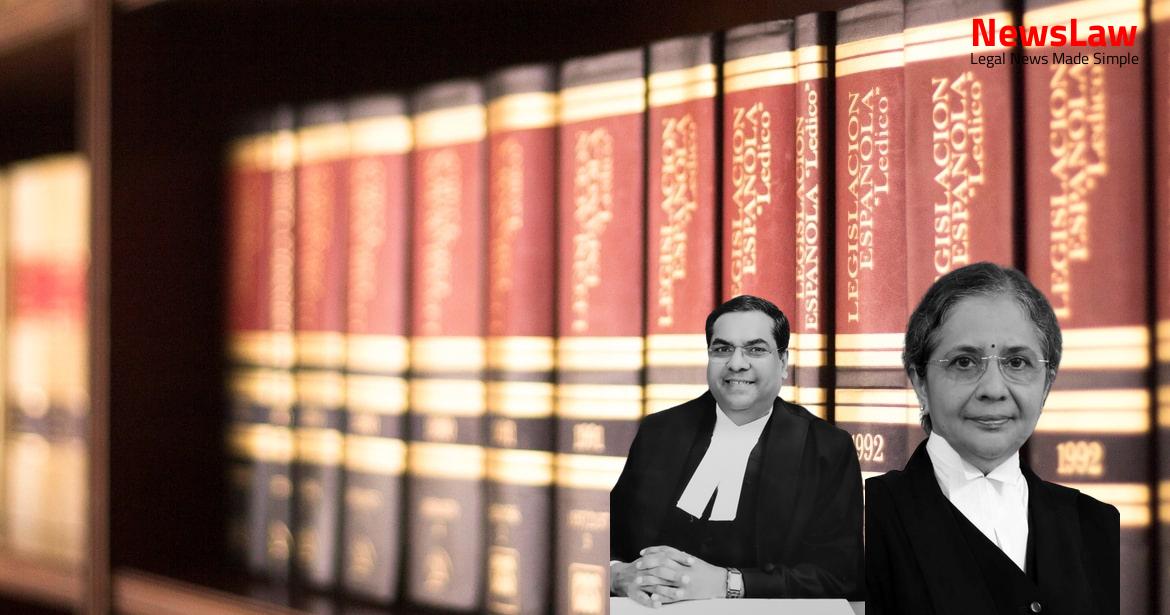Explore the intricate legal analysis conducted by the court in a recent case regarding Regulations and Exemption under the Electricity Act. The Division Bench’s decision sheds light on the interpretation of key provisions, influencing the outcome of the dispute. Dive into the complexities of the court’s ruling and understand the impact it has on the parties involved.
Facts
- The parties entered into a dispute over the validity of the contract
- The court considered the evidence presented by both sides
- The court found that the contract was valid and enforceable
- The decision was made in favor of the plaintiff
- The High Court ruled that exemption from Regulations 6 & 7 of the Safety Regulations can only be granted to employees employed with the KSEBL on the date of the transfer scheme, not to those who joined after 31.10.2013.
- KSEBL was directed to make promotions as per Regulations 6 and 7 of the Safety Regulations.
- KSEBL (Respondent No. 2) challenged the High Court’s judgment through an appeal.
- The Division Bench considered the validity of Regulation 116 of the Central Electricity Authority (Measures relating to Safety and Electric Supply) Regulations, 2010, and its alignment with the Electricity Act, 2003.
- The Division Bench held that Regulation 116 is not ultra vires the Electricity Act and is in line with the Act’s objectives.
- The Government Order granting exemption to employees who joined after 31.10.2013 was partially set aside by the Division Bench.
- A writ petition was filed in the High Court to declare Regulation 116 of the Safety Regulations as ultra vires the rule-making power of the Central Electricity Authority under the Electricity Act, 2003.
Also Read: Reversal of High Court’s Decision on Auction Sale Confirmation
Arguments
- Learned Senior Counsel argued that the Government does not have the power to grant exemption but can deviate under Regulation 116 of the Safety Regulations.
- The term ‘deviation’ in Regulation 116 cannot be construed to include ‘exemption’.
- The relief granted to erstwhile employees of the Board falls within the scope of Regulation 116.
- The dispute in Glynn v. Margetson & Co. was about interpreting a clause in a bill of lading mentioning ‘deviation’.
- Exemption from qualification under Regulations 6 and 7 is limited to employees in service prior to 31.10.2013.
- Regulation 116 was held to be beyond the power conferred by the Electricity Act in a judgment by a Single Judge.
- The Division Bench exempted employees working in the Board before 31.10.2013 from qualifications, which was subjected to challenge.
- Deviation is argued to be equivalent to exemption by the State and KSEBL.
- The scope of deviation is contended to be different from exemption based on dictionary meanings.
- The Appellants argue that wholesale exemption from educational qualifications is impermissible under Regulation 116.
- Regulations 6 and 7 of the Safety Regulations pertain only to the safety of officers and employees and do not concern their service conditions.
- The Electricity Act of 2003 consolidated laws related to electricity industry development, competition promotion, consumer interest protection, rationalization of electricity tariff, and other related matters.
- Section 53 of the Electricity Act relates to safety and electricity supply, giving options to State Governments regarding State Electricity Boards and State transmission Utilities.
- The Appellants are bound by the Tripartite Agreement according to Mr. Venugopalan Nair, learned counsel for Respondent No.7.
Also Read: Interest Compensation Dispute in Property Demolition Case
Analysis
- Engineers or supervisors engaged in operation and maintenance of transmission and distribution systems must hold a diploma in electrical, mechanical, electronics, or instrumentation engineering from a recognized institute or university.
- Technicians assisting engineers or supervisors should possess a certificate in an appropriate trade from an Industrial Training Institute recognized by the Central or State Government.
- Training for operation and maintenance of transmission and distribution systems must be undergone by engineers, supervisors, and technicians as specified.
- The owner of every transmission or distribution system is responsible for arranging training for personnel engaged in operation and maintenance.
- The Central Electricity Authority is empowered to undertake measures to protect public safety and regulate the generation, transmission, and distribution of electricity.
- Regulations specify safety measures for operation and maintenance of electric plants, including qualifications for engineers, supervisors, and technicians.
- Provisions of the Electricity Act detail the reorganization of the Kerala State Electricity Board (KSEB) and the transfer of properties, rights, and liabilities to the State Government or designated entities.
- The State Government may formulate transfer schemes to address the transfer of officers and employees to new entities while ensuring their terms and conditions are not less favorable than before.
- Division Bench reversed the findings of the Single Judge and directed KSEB Ltd. to submit a copy of the Committee report and an action taken report on the Committee’s recommendations.
- Trio party agreement may be entered into by the State Government, KSEB Ltd., and employees’ unions considering promises and mutual conditions.
- Provisional figure of unfunded liability is approximately 7584 Crores as of September 30, 2011.
- Re-organization of Electricity Board done as per the Electricity Act through a transfer scheme ensuring service conditions of employees are not inferior.
- Proviso in Section 133(2) protects the transferees’ interests by not having their service conditions less favorable than if no transfer took place.
- Court decision regarding deviation from Regulations 6 and 7, limiting it to employees transferred before October 31, 2013.
- Employees entitled to existing service conditions are protected under the tripartite agreement dated August 1, 2014.
- Implementation of Safety Regulations requires specific qualifications for operation and maintenance tasks.
- Tripartite agreement signed on August 1, 2014, between the State of Kerala, KSEBL, and unions representing employees for a smooth transition.
- Government order deviating from Safety Regulations qualifications was challenged by the Appellants, citing safety concerns and eligibility issues.
- Central Electricity Authority framed Safety Regulations in 2010, enforced through a transfer scheme and tripartite agreement to protect the service conditions of transferred employees.
- Regulation 116 allows the State Government to deviate from Safety Regulations, impacting qualifications for promotions and affecting safety norms.
- Key points to consider in the analysis include the protection of service conditions, deviation from regulations, and the impact on safety standards.
- Interpretation must depend on the text and the context.
- The word ‘deviation’ has to be interpreted by following the principle laid down in RBI v. Peerless General Finance & Investment Co. Ltd.
- In the context of the dispute in the RBI case, the word ‘exemption’ puts a person beyond the law, while ‘permission’ grants leave to act in a particular way.
- The word ‘permission’ has a wide import as it means leave to do some act while ‘exemption’ is just one way of giving leave.
- The House of Lords opinion on interpreting the primary intent and object of a bill of lading in the context of general/printed words therein.
- The power of exemption from safety provisions existed even prior to the Electricity Act, as seen in Rule 133 of the Indian Electricity Rules, 1956.
- The judgment in M/s. Dhanrajamal Gobindram v. M/s. Shamji Kalidas & Co. is mentioned but not applicable in the present case for interpreting Regulation 116 of the Safety Regulations.
- Efforts will be made to appoint eligible and qualified personnel in generating stations, electrical plants, and key positions in transmission and distribution lines.
- State Government’s power in issuing the order dated 13.02.2019 is within its jurisdiction.
- Grant of exemption to erstwhile employees is not arbitrary.
Also Read: Legal Interpretation of Extension of Judicial Member’s Term
Decision
- Extension of continuity to employees appointed after 31.10.2013 is deemed unreasonable.
- Only transferred employees are entitled to protection of their service conditions.
- High Court of Kerala’s Division Bench findings are approved.
- Appeals are dismissed based on the above reasons.
Case Title: MUHAMMED A.A. Vs. THE STATE OF KERALA (2022 INSC 199)
Case Number: C.A. No.-001498-001500 / 2022



